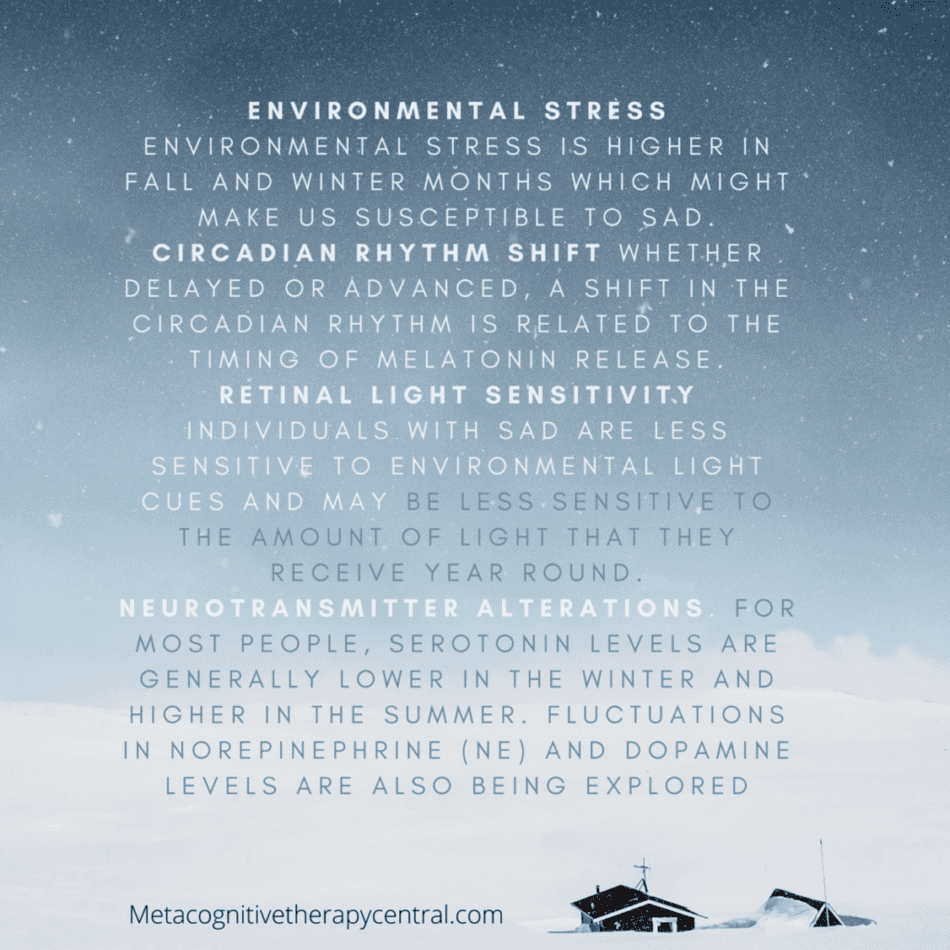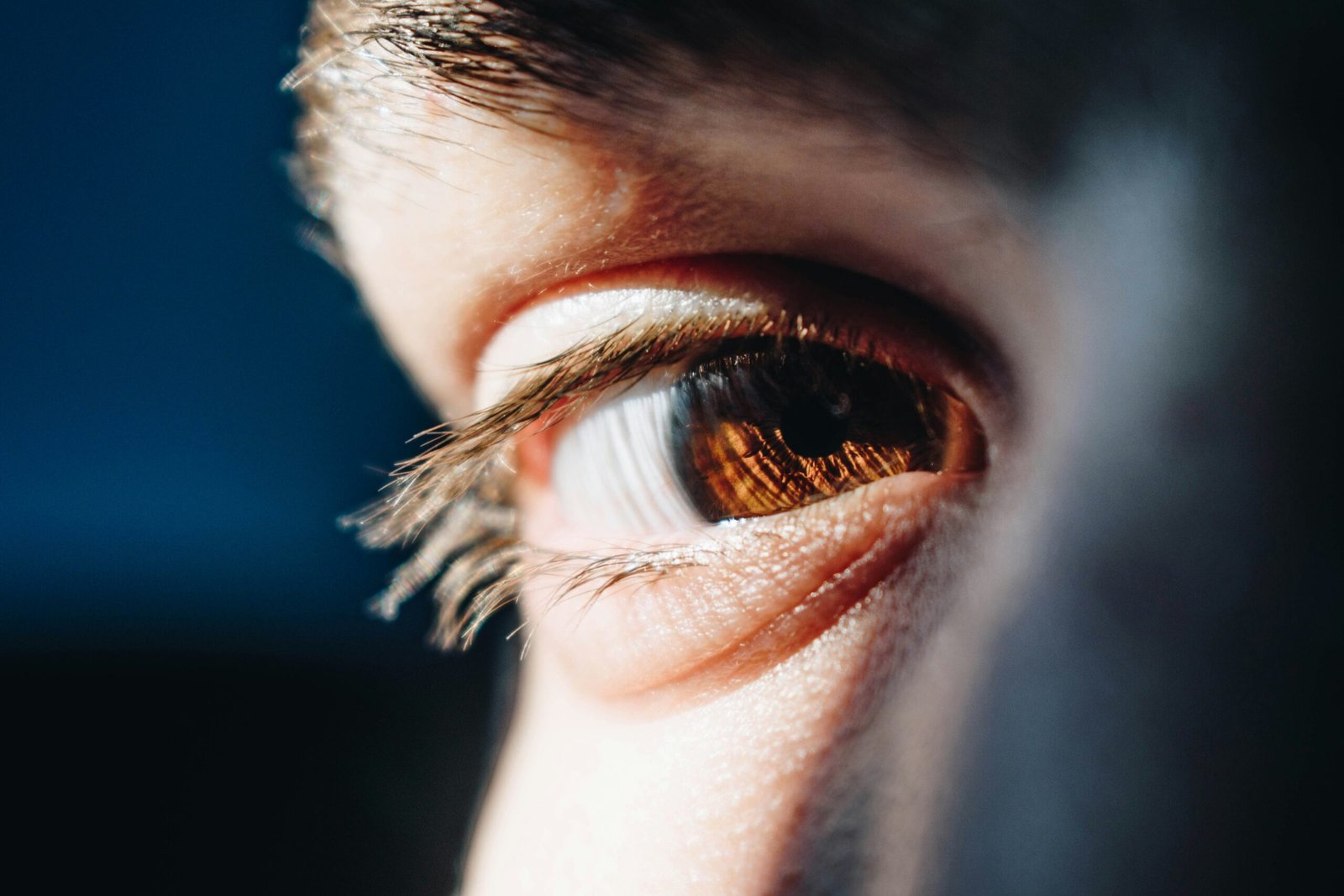
Clients who see me for various mental issues tell me that learning Metacognitive therapy (MCT) has also helped them beat winter depression without directly addressing it in therapy.
Metacognitive therapy can treat winter depression because winter depression shares the exact underlying mechanisms that drive major depressive disorder: rumination and metacognitive beliefs about not being able to control ruminations.
So if winter depression shares the same patterns as depression, why does it only appear in the winter months? Clearly, there must be a seasonal component that plays a role as well?
Although winter depression is known as Seasonal affective disorder (SAD), it is formally called Major depressive disorder with seasonal pattern in the Diagnostic Manual of Mental Disorders (DSM-5).
Is winter depression really caused by the winter?
Although biological factors like less light sensitivity may increase the frequency of negative thoughts and low mood during the winter, processing these thoughts through rumination prolongs the low mood. This leads to winter depression.
Winter depression is a pattern of major depressive episodes that recur in the fall and winter and remit in the spring. This type of depression often causes
- loss of energy
- need for more sleep
- overeating
- weight gain
- craving for carbohydrates
Biological mechanisms of winter depression
Although research on biological reasons for winter depression has dominated as possible explanations for winter depression, increasing evidence suggests that psychological (cognitive) factors play an important role in its development. The biological factors are:
- Environmental Stress
- Circadian Rhythm Shift
- Retinal Light Sensitivity
- Serotonin Levels

Cognitive mechanisms of winter depression
There seems to be a correlation between the colder and darker months and people experiencing winter depression. But studies also show that patients with winter depression frequently have extremely negative thoughts about the winter season: short day length and environmental cues signaling the arrival of winter (e.g., cloud cover, cold temperatures, snow).
Aside from ruminating about their negative thoughts, patients who suffer from winter depression also believe that they lack control over their mood.
According to them, their low mood is because of the current season and less light availability. These patients also believe that because of these out-of-control factors, they can’t function as efficiently as usual. As a result, they view themselves as failures and infective.
For example, patients with winter depression believe the following about themselves:
There’s something wrong with me in the winter.
I’m stuck in a rut in the winter.
I don’t expect much of myself in the winter.
I can’t snap out of my winter funk.
I’m in a fog all winter long.
I’m ineffective in the winter.
I am going to have the winter blues every year.
I’m a failure in the winter.
If you are very familiar with Metacognitive theory, you might recognize that these beliefs are similar to the metacognitive beliefs of people with depression:
There is something wrong with my brain
I can’t function when I am so low
I will never get better
I can’t control my ruminations
There is enough support in the literature to assume that winter depression is caused by the same mechanisms that drive major depressive disorder: Rumination about negative thoughts and false metacognitive beliefs (as those shown above).
Therefore, the treatment of winter depression won’t vary much from regular MCT treatment for depression.

How does MCT cure winter depression?
The following MCT steps are important in the treatment of winter depression.
1) Connecting the dots
Rumination causes depression. Not the season.
The first step in the treatment is to understand that although the season (less daylight light, etc.) initially triggers a low mood, it is the active rumination that causes the winter depression because it maintains the low mood.
2) Learning to reduce ruminations
Postponing to ruminate to a later time during the day helps the brain to regulate a low mood.
Rumination is an active and voluntary thinking strategy that goes round in circles. Usually, rumination cycles are triggered by “why?” questions. So, for example, if someone finds that they are in a low mood when they wake up in the morning, they might ruminate to find answers for their condition.
But since rumination doesn’t help them arrive at satisfactory answers and only worsens the mood, patients need to learn to reduce it. You can learn to postpone ruminating by saying this to yourself:
“I am ruminating about my low mood, and it’s making me feel even worse. I am going to postpone doing it until tonight.“
If you have been ruminating for a long time, you might find it hard to stop right away. Therefore, it is essential that you don’t give up too early in the process.
3) Challenging metacognitive beliefs about uncontrollability
Patients must regain control over their ruminative process. If they don’t believe that rumination is controllable, they need to gain new experiences in therapy that prove it.
Experimenting with this part in therapy can be fun and eye-opening. Usually, challenging metacognitive beliefs is done through behavioral experiments.
4) Reducing unhelpful coping strategies that backfire
Withdrawing from daily and social activities, sleeping more, and checking in on your low mood doesn’t help you recover from depression. In fact, these coping strategies backfire in the end and worsen depression.
People with depression lack motivation and energy to go on with their daily lives because they ruminate so much. They, therefore, withdraw from various activities and wait for their mood to improve before they can resume. Therefore, it is important to learn that they can complete daily tasks regardless of how they feel.
What are current treatments for winter depression?

Studies have shown that light therapy, anti-depressant medication, and CBT are appropriate options for treating winter depression. However, none of these treatments are better than the other. Therefore, doctors let their patients choose their preferred treatment method among these.
Light therapy
Light therapy (exposing oneself to a LED light source for 30 minutes each day) improves depressive symptoms after two weeks of treatment. However, if treatment is discontinued, most patients relapse after a similar period.
But it is difficult to measure the effects of light therapy because it is difficult to create an acceptable placebo (It is important to use a placebo in research experiments because it weakens or eliminates the effect that expectations can have on the outcome.
Cognitive-behavioral therapy (CBT)
Treatment with CBT, with or without adjunct light therapy, significantly reduces symptoms of winter depression. Some studies mention that CBT is better than light therapy, and others claim that they have the same effect. Part of the CBT treatment restructures negative automatic thoughts specific for people with winter blues and encourages clients to go through the motions of performing daily activities. Patients who do this experience pleasure/mastery from these behaviors.
Other recommended treatments and preventions
Fluoxetine (Prozac), which is an anti-depressant medication is the recommended and most researched anti-depressant drug for winter depression. It supports the hypothesis that a lower serotonin level in the brain might be causing winter depression.
Research, however, shows that light therapy and fluoxetine are comparably effective and well tolerated and that other clinical factors, including patient preference, should guide the selection of treatment.
Some experts recommend certain lifestyle adjustments to prevent winter depression, including exercising more often, increasing light in the home, practicing relaxation and stress management techniques, spending more time outside, and visiting sunnier, warmer climates.
How you can treat winter blues
Whether you experience some winter blues or full-blown winter depression, there are a few steps you can take preventively. Remember, if you experience suicidal ideation and intent, it is important that you immediately seek a licensed MCT therapist for treatment.
- Recognize that rumination is within your control. Whenever you notice that you are ruminating, decide to postpone it to a later time during the day. Use following frase: “I am ruminating right now. It’s is not helpful and I am going to postpone doing it till later.”
- Get out of your head and do some activities. Whether you have hobbies that you have neglected or chores, just get up and do them. You don’t need to feel in the right mood for it. In fact, you can feel very low and still work, clean, or meet friends.
- Don’t take your mood too seriously. It is perfectly normal to feel down. Even if you experience a severe low mood during the darker months. Luckily, feelings don’t last forever if we don’t ruminate too much about them. Spend your time on an ineresting hobby or work project instead and don’t worry too much about you feel and let your mind self-regulate. You are going to feel better again at some point.



